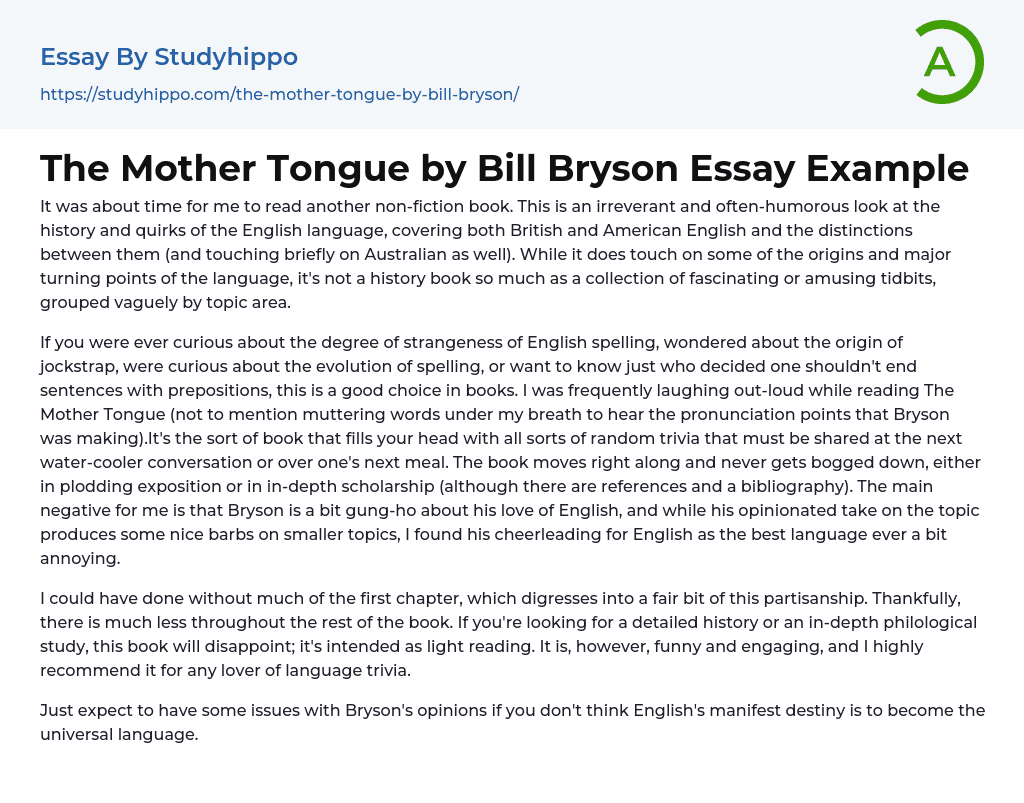It was about time for me to read another non-fiction book. This is an irreverant and often-humorous look at the history and quirks of the English language, covering both British and American English and the distinctions between them (and touching briefly on Australian as well). While it does touch on some of the origins and major turning points of the language, it's not a history book so much as a collection of fascinating or amusing tidbits, grouped vaguely by topic area.
If you were ever curious about the degree of strangeness of English spelling, wondered about the origin of jockstrap, were curious about the evolution of spelling, or want to know just who decided one shouldn't end sentences with prepositions, this is a good choice in books. I was frequently laughing out-loud while reading The Mother To
...ngue (not to mention muttering words under my breath to hear the pronunciation points that Bryson was making).It's the sort of book that fills your head with all sorts of random trivia that must be shared at the next water-cooler conversation or over one's next meal. The book moves right along and never gets bogged down, either in plodding exposition or in in-depth scholarship (although there are references and a bibliography). The main negative for me is that Bryson is a bit gung-ho about his love of English, and while his opinionated take on the topic produces some nice barbs on smaller topics, I found his cheerleading for English as the best language ever a bit annoying.
I could have done without much of the first chapter, which digresses into a fair bit of this partisanship. Thankfully, there is much les
throughout the rest of the book. If you're looking for a detailed history or an in-depth philological study, this book will disappoint; it's intended as light reading. It is, however, funny and engaging, and I highly recommend it for any lover of language trivia.
Just expect to have some issues with Bryson's opinions if you don't think English's manifest destiny is to become the universal language.
- Second Language essays
- English Language essays
- Semiotics essays
- Dialect essays
- Sign Language essays
- Spanish Language essays
- French Language essays
- Language Education essays
- Second Language Acquisition essays
- Teaching English As A Foreign Language essays
- Verb essays
- Gesture essays
- Book Summary essays
- Metaphor essays
- Reader essays
- Rhyme essays
- Literary devices essays
- Villain essays
- Books essays
- Genre essays
- Literary Criticism essays
- Writer essays
- Protagonist essays
- Simile essays
- Poem essays
- Book Report essays
- Book Review essays
- Greek Mythology essays
- Plot essays
- Tragic Hero essays
- Coming of Age essays
- Play essays
- Rhetoric essays
- Rhetorical Question essays
- Translation essays
- Understanding essays
- Reason essays
- Character essays
- Letter essays
- American Literature essays
- Literature Review essays
- Utopia essays
- Poetry Analysis essays
- Dante's Inferno essays
- Between The World and Me essays
- Incidents in The Life of a Slave Girl essays
- Flowers for Algernon essays
- Myth essays
- Everyday Use essays
- Boo Radley essays




